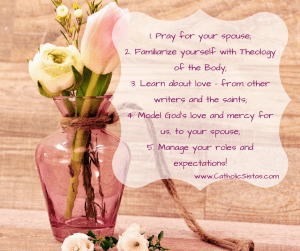
Like many military couples, my husband and I were first married by the local Justice of the Peace. We already had our “church wedding” date set, so we chose the same month and day, only a year early, in order to make everything legal. In the year leading up to our Convalidation, we took part in the local diocese’s mandatory pre-marriage classes, meeting as a couple with another couple, a few times each month.
Looking back on it now, almost a decade later, I realize our learning and growth, both as individuals and as a couple, did not stop at either wedding. And, there is immense value, wisdom, and love in the teachings of the Catholic Church, as it pertains to Sacramental unions. From my years of study and lived experience, allow me to impart some wisdom to those just starting out, and perhaps remind those of us solidly entrenched in this sacrament.
1.) Pray for your spouse. Many couples, and the Church itself, advocates family prayer – the family is known as the Domestic Church, after all! But, just as important as praying together, is the act of praying individually for our spouses. A wiser Catholic wife shared once she has an alarm set, and I took her recommendation to do the same. My phone reminds me every day, usually set for a time my husband would be headed home (if he had a typical 9-5 job) to pray for him. Sometimes, the prayer is lengthy; other times, it is a brief, “Jesus, watch over my husband on his way home.”
2.) Familiarize yourself with the concept and beauty of the teaching of Theology of the Body. St. John Paul II wrote extensively on the beauty and dignity of women… and the Sacrament of Matrimony. He reassured Catholics that sex is a pleasurable act, to be saved until marriage so that we are able to join with God as co-creators of life – because at the moment we are giving ourself wholly to our spouse, God is with us. Realizing God is truly in that moment is a beautiful and powerful realization… which is also a difficult one to remember when we internalize our secular culture’s view on sex as being solely an act of pleasure. It is so much more than pleasure-based, which is part of the added beauty of the procreative act.
3.) Learn about love – from Catholic writers and speakers… and, the Catholic saints! Christopher West, renowned for his work on Theology of the Body explains how our marital love is but a foreshadow of the love we experience from God. So, what we give to, and receive from our spouse is just a taste of what we aim to receive in our life after death. St. Teresa of Calcutta, a woman who lived in the world, giving herself entirely and devotedly to the world, reminds us that, while “Not all of us can do great things, but we can do small things with great love…” She also directs us to, “Wash the plate not because it is dirty, nor because you are told to wash it, but because you love the person who will use it next.” St. Frances of Rome also shares wisdom with wives, reminding us, “It is most laudable in a married woman that she be devout, but she must never forget that she is a housewife. And sometimes she must leave God at the altar to find Him in her housekeeping.” The saints wrote about love extensively – both God’s love for us, and ways in which we can better love our own spouses.
4.) Model God’s love and mercy for us, to our spouse. God doesn’t always like the choices we make. Sometimes, He wonders what we are thinking, and He shakes His head disapprovingly. But, He also recognizes our free will and has infinite love, and more importantly, mercy – if we are willing to seek it. Because we are called to sanctification through our vocation of marriage, we are challenged to be God’s tangible love and mercy to our spouse. This is not to say there aren’t consequences for our behavior or actions, but we are called to be loving and merciful to our spouse, even if we may not like their choices or actions. This advice also presupposes the Sacrament of Matrimony is healthy, and there is no physical, sexual, or emotional abuse – because abuse is never justifiable. The Church even acknowledges there is no room for abuse in a sacramental marriage.
5.) Manage your roles and expectations. Keep in mind, the roles and expectations you have at the outset of the marriage may shift. Every change during a marriage, i.e. change in employment, adding a family member, moving, etc., brings the necessity to manage the roles and expectations each person has in their marriage. Your roles and expectations may change over time. And, that is okay! Keeping an open dialogue, and being honest with yourself and your spouse, is a guaranteed way to meet the ebb and flow of marriage. Because you are a team, united with God, it is important to keep the avenues of communication open, and have the discussions of each others’ roles and expectations (for both yourself, and your spouse) together.

In our culture, it is easy to lose focus on the beauty of the Sacrament of Matrimony. It is easy to get stuck in noticing the imperfections of our spouse, while overlooking our own contribution to the state of our marriage. But, as Catholic Christians, we are striving to achieve sainthood.
As married couples, we are called to the path of sainthood through our vocation as wives or husbands. Furthermore, we are challenged, sometimes more than others, to help our spouse achieve sainthood with us. Yet, putting these five steps in the forefront of your mind may just help ease some of the work toward sainthood, and may in fact help enhance the journey!
